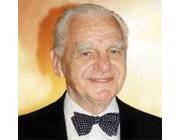
b. 1917, Turda (Cluj) – d. 2000, London. Businessman, politician, journalist, lawyer.
He donated the entire book fund, periodical publications, documents and manuscripts to the Central University Library of Cluj, where a special fund was set up bearing his name. This collection is particularly important for all historians studying the Cold War period and the relations of the Eastern Bloc countries with the West.
Ion Augustin Nicolae Ratiu was born in Turda, where he spent his childhood and youth. He attended high school in Turda and Cluj, continuing his university studies in Cluj, where, in 1938, he obtained his law degree. During the last year of his studies he began to work in the office of lawyer Ionel Pop, nephew of Iuliu Maniu and former vice-president of the Chamber of Deputies. His military education was at the school of reserve officers in Craiova, where he graduated as a valedictorian. In February 1940 he was appointed to the Foreign Ministry and sent on a mission to the Romanian Legion in London (where his uncle, Ambassador Viorel Virgil Tilea, was also located). Marshal Antonescu's decision to ally himself with the Axis powers led the young Ration to resign from his post and seek political asylum in England. He obtained a scholarship at St. John's College, Cambridge, where he studied Economics for three years. During his time at Cambridge, he made a series of political radio broadcasts, addressing the issue of Transylvania and the Vienna Dictate in particular. Although young, he was co-opted into the Executive Committee of the "Free Romanian Movement", a committee that opposed Romania's entry into the war with Nazi Germany, arguing that Romania's place should be with the great powers of the West, who supported the creation of Greater Romania in 1918. After the end of the war in 1945, Ion Ratiu married Elisabeth Pilkington in London, with whom he had two children: Indrei and Nicholas. With the establishment of the communist regime in Romania, Ion Ratiu, aware of the fate that would await him if he returned to the country, decided to stay with his family in England. He will join the US news agency International News Service (today, part of United Press International). During the Peace Conference, as a press correspondent, Ion Ratiu wrote about the significance of peace treaties with Balkan countries, in particular, about the one with Romania. During the signing of the treaties, he had the opportunity to follow the official delegation of Romania, but his contacts were limited only to the unofficial delegation of Romanians, as well as to the known Westerners. After the Peace Conference, he continued to work in the press for a while, realizing, however, that without serious economic resources, it will be impossible for him to fulfill his support projects for Romania, which remained, after the war, in the Soviet sphere of influence. Thus, he joined a shipping company, also dealing with radio transmissions. In 1955 he began editing a weekly English-language newsletter, Free Romanian Press - with the aim of informing the West, especially the newspapers, deputies and influential politicians in England, about the situation in Romania. After 20 years, he managed to turn this publication into a small, sapirographed magazine, a monthly, bilingual brochure. In 1965, the ACARDA Association (Cultural Association of Romanians in England) was established, and Ion Ratiu was elected president. Although it was called a "cultural" association, according to the Arlene tradition, culture does not exclude politics; on the contrary, it encompasses it, harmonizing the Romanian aspirations of democratic affirmation and freedom. A year after the establishment of the Free Romanian Union (1984), "Free Romanian" appeared in two editions (Romanian and English). As a businessman, Ion Ratiu managed to establish his own shipping company in 1957, continuing this activity until 1975, when, at the age of 58, he decided to devote himself entirely to the Romanian problem. He thus became one of the most sincere and consistent voices of the opposition against Nicolae Ceaușescu and the regime to which he bravely and fiercely opposed.
On 25 December 1989, Ratiu initiated a wide-scale campaign to help Romania, coordinated by the "Relief Fund for Romania", headquartered in London, a charity that brought medicine, food and clothing to Romania alone, estimated at over 10 million pounds. In 1990, he returned to Romania, running for the Presidency of Romania, and came in third. In the 1990 and 1992 elections, respectively, he was elected deputy of Cluj from the PNTCD, and in 1996 he was elected deputy of Arad, also from the PNTCD. Ion Ratiu passed away in London after a short illness, surrounded by his family. According to his wishes, his body was buried in January 2000 in his hometown of Turda. More than 10,000 people attended the funeral.


